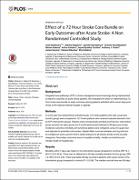| dc.contributor.author | Nakibuuka, Jane | |
| dc.contributor.author | Sajatovic, Martha | |
| dc.contributor.author | Nankabirwa, Joaniter | |
| dc.contributor.author | Ssendikadiwa, Charles | |
| dc.contributor.author | Kalema, Nelson | |
| dc.contributor.author | Kwizera, Arthur | |
| dc.contributor.author | Byakika-Tusiime, Jayne | |
| dc.contributor.author | Furlan, J. Anthony | |
| dc.contributor.author | Kayima, James | |
| dc.contributor.author | Ddumba, Edward | |
| dc.contributor.author | Katabira, Elly | |
| dc.date.accessioned | 2021-04-30T09:11:27Z | |
| dc.date.available | 2021-04-30T09:11:27Z | |
| dc.date.issued | 2016-05-04 | |
| dc.identifier.citation | Nakibuuka, J., Sajatovic, M., Nankabirwa, J., Ssendikadiwa, C., Kalema, N., Kwizera, A., Byakika-Tusiime, J., Furlan, A.J., Kayima, J., Ddumba, E. and Katabira, E., 2016. Effect of a 72 hour stroke care bundle on early outcomes after acute stroke: a non randomised controlled study. PloS one, 11(5), p.e0154333. | en_US |
| dc.identifier.issn | 1932-6203 | |
| dc.identifier.uri | http://hdl.handle.net/20.500.12280/2805 | |
| dc.description.abstract | Background
Integrated care pathways (ICP) in stroke management are increasingly being implemented to improve outcomes of acute stroke patients. We evaluated the effect of implementing a 72 hour stroke care bundle on early outcomes among patients admitted within seven days post stroke to the national referral hospital in Uganda.
Methods
In a one year non-randomised controlled study, 127 stroke patients who had ‘usual care’ (control group) were compared to 127 stroke patients who received selected elements from an ICP (intervention group). Patients were consecutively enrolled (controls first, intervention group second) into each group over 5 month periods and followed to 30-days post stroke. Incidence outcomes (mortality and functional ability) were compared using chi square test and adjusted for potential confounders. Kaplan Meier survival estimates and log rank test for comparison were used for time to death analysis for all strokes and by stroke severity
categories. Secondary outcomes were in-hospital mortality, median survival time and median length of hospital stay.
Results
Mortality within 7 days was higher in the intervention group compared to controls (RR 13.1, 95% CI 3.3–52.9). There was no difference in 30-day mortality between the two groups (RR 1.2, 95% CI 0.5–2.6). There was better 30-day survival in patients with severe stroke in the intervention group compared to controls (P = 0.018). The median survival time was 30 days (IQR 29–30 days) in the control group and 30 days (IQR 7–30 days) in the intervention group. In the intervention group, 41patients (32.3%) died in hospital compared to 23 (18.1%) in controls (P < 0.001). The median length of hospital stay was 8 days (IQR 5–12
days) in the controls and 4 days (IQR 2–7 days) in the intervention group. There was no difference in functional outcomes between the groups (RR 0.9, 95% CI 0.4–2.2).
Conclusions
While implementing elements of a stroke-focused ICP in a Ugandan national referral hospital appeared to have little overall benefit in mortality and functioning, patients with severe stroke may benefit on selected outcomes. More research is needed to better understand how and when stroke protocols should be implemented in sub-Saharan African settings. | en_US |
| dc.language.iso | en | en_US |
| dc.publisher | PUBLIC LIBRARY SCIENCE , 1160 BATTERY STREET, STE 100, SAN FRANCISCO, USA, CA, 94111 | en_US |
| dc.relation.ispartofseries | PloS one;11(5) | |
| dc.subject | Stroke care bundle | en_US |
| dc.subject | Acute stroke | en_US |
| dc.subject | Non randomised | en_US |
| dc.title | Effect of a 72 Hour Stroke Care Bundle on Early Outcomes After Acute Stroke: A Non Randomised Controlled Study | en_US |
| dc.type | Article | en_US |


